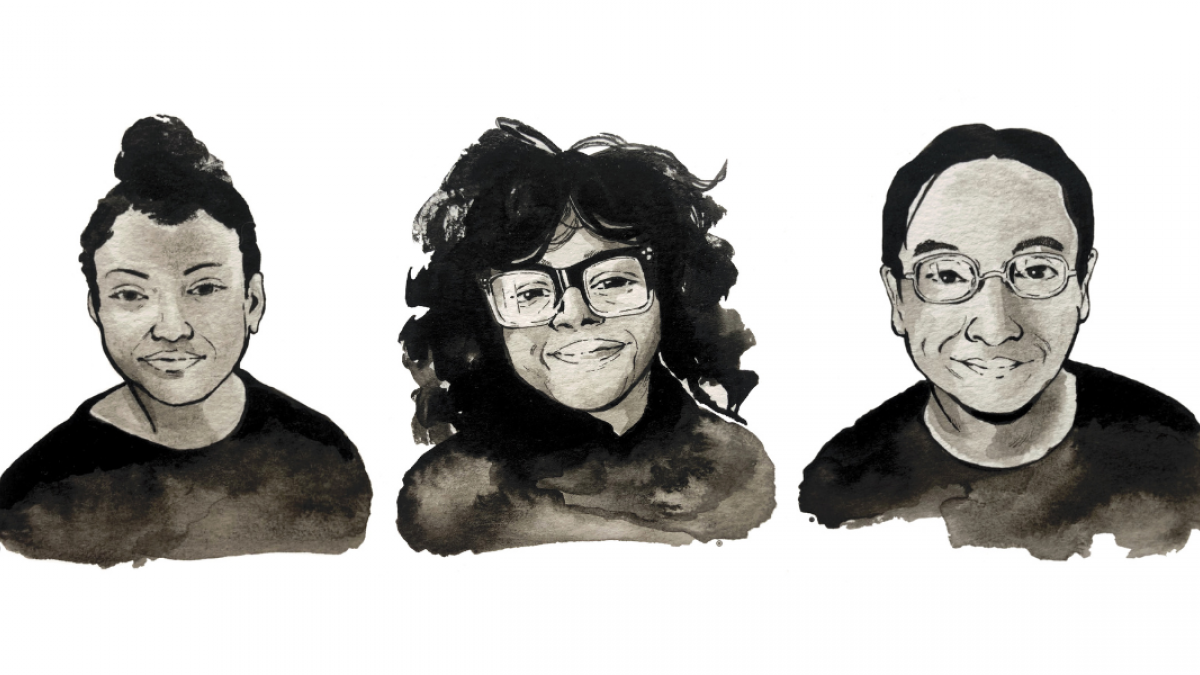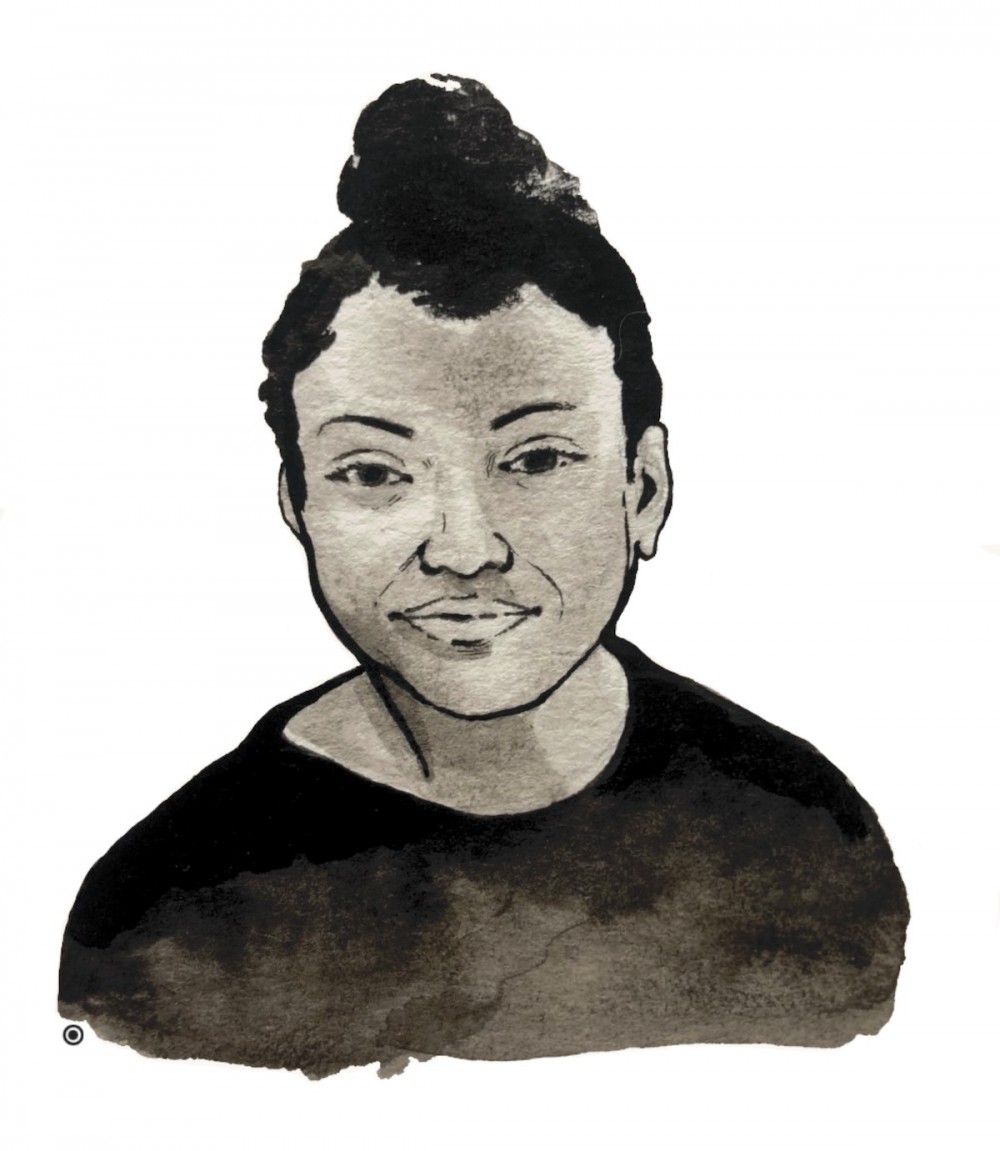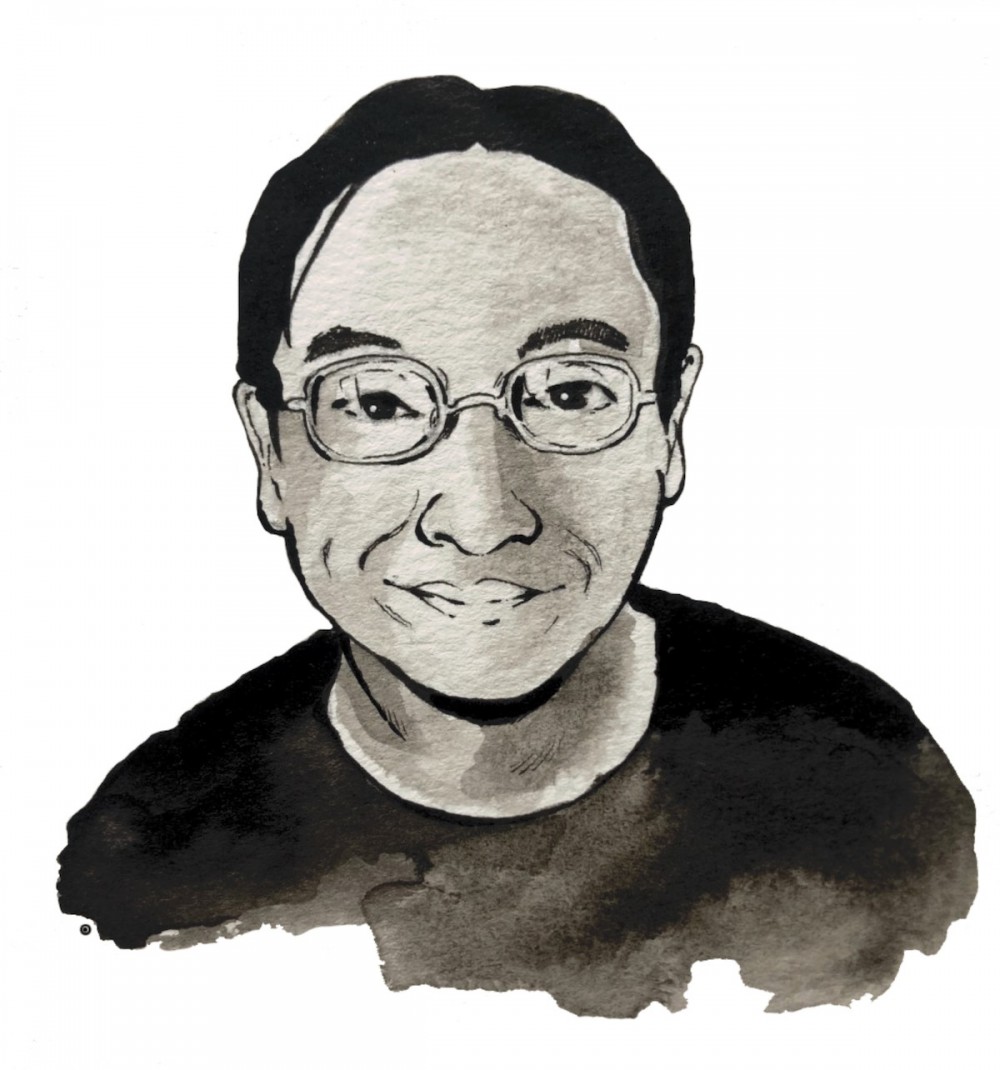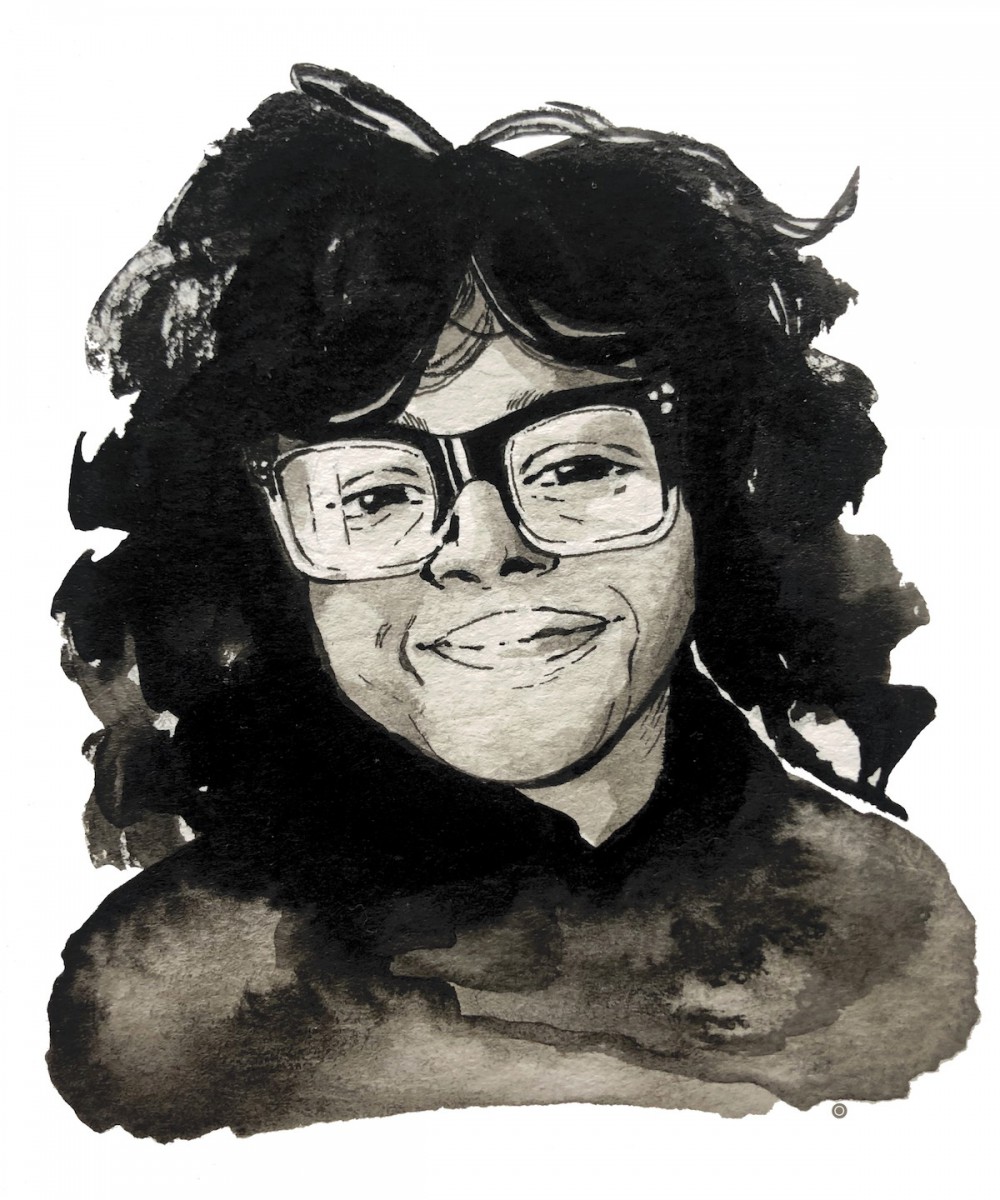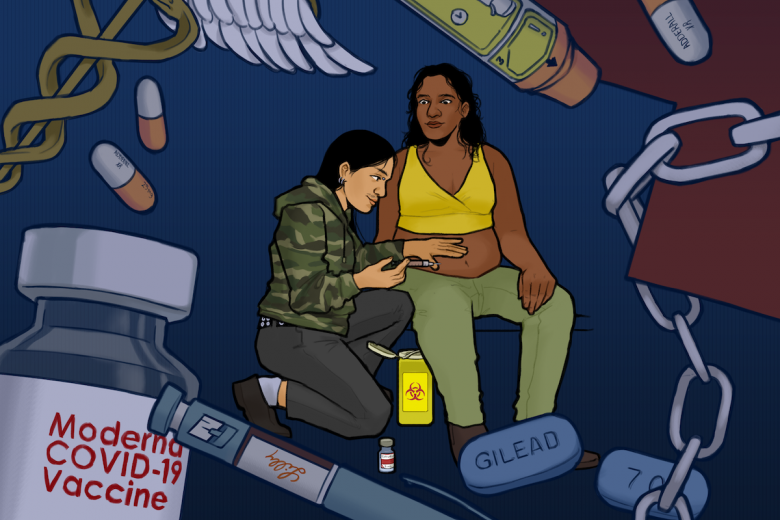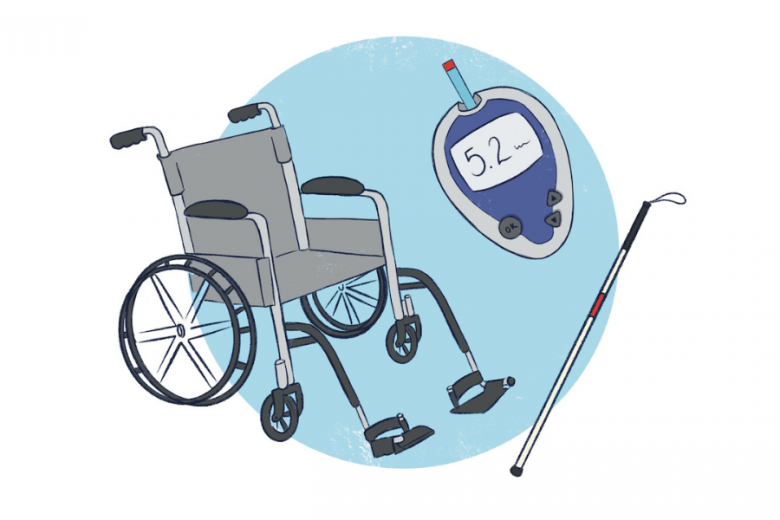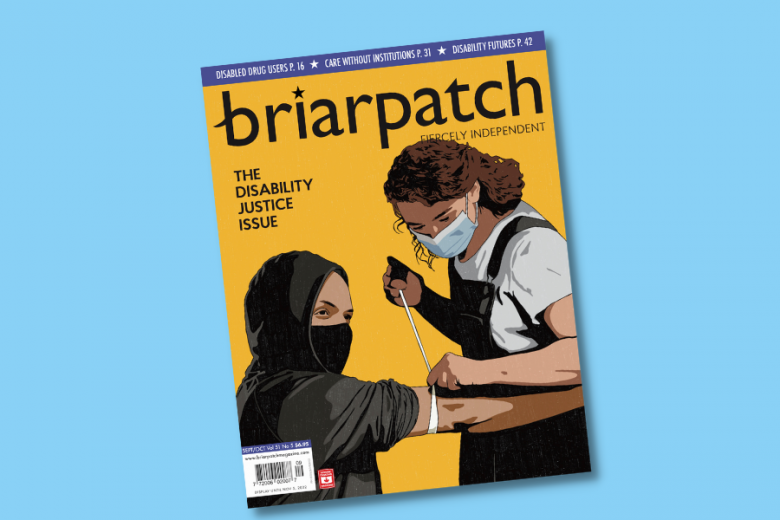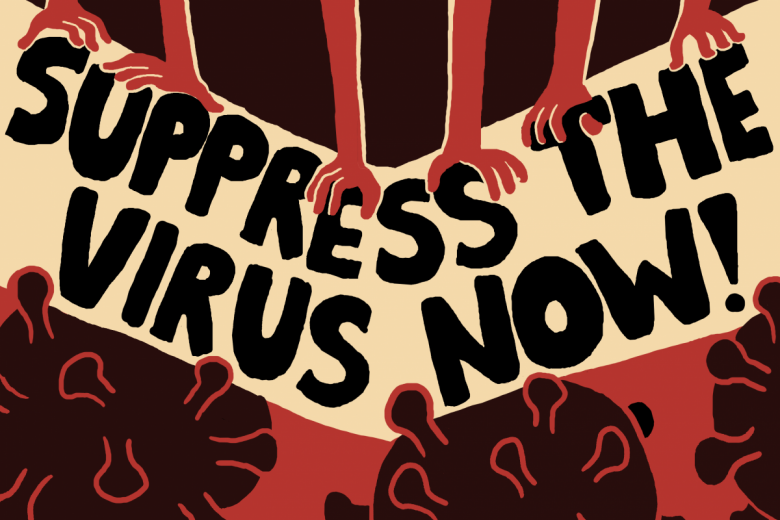Plain language summary (What is this?)
- For every 10 people who get COVID, one or two of them get long COVID. People with long COVID can have serious long-term COVID symptoms like trouble breathing, heart palpitations, brain fog, and changes in smell and taste.
- Yasmine Simone Gray spoke to three people living with long COVID: Ed Ng in British Columbia, Tracey Thompson in Ontario, and Tanaeya Taylor in Nova Scotia.
- They say governments have provided few to no meaningful supports for people with long COVID. Most governments don’t recognize long COVID as a health condition. There are very few health-care clinics and experts dedicated to helping people with long COVID. Plus, people with long COVID may not qualify for financial support for disabled people – and when they do, it’s not enough money to live.
- “It’s part of a long-standing problem of discrimination against disabled people,” says Thompson, who is unable to work because of her long COVID. “When it turns out you can’t [work], you’re seen as less of a person.”
- They say governments need to support people with long COVID with more funding, more public education, and better health care. People also need to be aware of the risks of long COVID and need to keep wearing masks.
“I went to the emergency department. I was having severe pressure in my head. I couldn’t keep my eyes open. My mom pretty much carried me into emerg [and] I was leaning on her, unable to steady myself. The triage nurse didn’t understand the symptoms I was describing. She asked me: ‘Is it a tension headache? I don’t know what you’re trying to tell me.’ Then she asked me if I was just there for pain meds.”
For over two years, Tanaeya Taylor has suffered from long COVID, the debilitating condition that can cause severe damage to the heart, kidneys, skin, and brain. Symptoms of long COVID can include respiratory problems such as difficulty breathing and heart palpitations. Neurological symptoms such as brain fog, difficulty speaking, and changes in sleep, smell, or taste are also common. A person’s risk of severe, long-term health impacts from COVID-19 increases with each infection.
Roughly 10 to 20 per cent of people infected with COVID-19 develop long COVID, meaning there are likely upwards of 400,000 Canadians who had or have the post-viral condition, and a disproportionate number of them are racialized. By lifting all public health precautions, the federal and provincial governments have declared the pandemic over, allowing the virus to mutate and putting more and more people at risk of infection, reinfection, and long COVID.
To better understand long COVID, the supports available, and the supports we need, I spoke to three people living with it: Ed Ng in British Columbia, Tracey Thompson in Ontario, and Tanaeya Taylor in Nova Scotia. They shared with me their experiences of illness; their provinces’ COVID policies and support for people with long COVID; and the type of support for long haulers they’d like to see.
Ed Ng is 53 years old and lives in Vancouver, British Columbia. Ed’s parents are originally from Hong Kong and China. Ed holds a law degree from the University of Alberta and he is self-employed.
Tracey Thompson is 54 years old and lives in Toronto, Ontario. A children’s book buyer turned chef, Tracey is now unemployed due to disability. In July, Tracey applied for medical assistance in dying (MAiD) because she, like many other poor disabled people, is unable to afford housing, food, and other living expenses. You can support her fundraiser for housing and medical costs at www.bit.ly/tracey-thompson.
Tanaeya Taylor is 25 years old and lives in Halifax, Nova Scotia. In her spare time, she likes to play piano and guitar and write songs. Tanaeya also manages the TikTok account @LongerThanCOVID, which has over 14,000 followers. She uses her TikTok account and podcast Longer Than COVID to educate people about long COVID.
What are some of the challenges you face as a person living with long COVID?
Ed: I got COVID in late February 2020 while I was travelling to the U.S. I work in the financial markets so I’m on the computer all day, but I found that because of my brain fog, I’m not able to think as clearly. I get more easily confused. I feel like my memory has gotten worse. I’ll use the wrong word and that never used to happen to me. I also experience fatigue and shortness of breath.
Tanaeya: I got COVID on March 15, 2020 – I am not sure from where. I may have been infected in Nova Scotia, where I worked at a drive-thru at the time, or I may have been infected while travelling in Quebec. The biggest problem is that I’m not able to work. I haven’t worked since November of last year. I can’t drive for more than 10 minutes. I can’t go to places like the grocery store or the mall or any store by myself because I get overstimulated and it’s really hard on my eyes and my brain. I also can’t hang out with people socially because usually those environments are too busy, too loud, and too bright for me. I’m also pretty nervous to hang out with people because I don’t want to get sick again.
Tracey: I’m primarily bedbound. I can’t really read anymore. I can read in short spurts, but I can’t read a novel because I can’t remember things from one page to the next. I have limited energy – that’s probably the biggest challenge for me. I haven’t been able to work for over two years and [I have to] carefully dole out what energy I’m going to use and for what purpose. Obviously, eating is number one, that comes before anything else, and I take it from there. I’d like to be able to entertain myself, but I can’t now [because I have] screen sensitivity – so no TV, no computer games, no reading, and no creative things because I don’t have the energy for them anymore.
What do you think about your province’s response to COVID?
Ed: I was infected early on in the pandemic, and at the time testing clinics asked for all the typical symptoms like fever and dry cough. If you didn’t have those symptoms, they wouldn’t see you. [The directive was] to “just stay home.” So when I got tested months later in August 2020 in Ontario, it was negative. When I first got long COVID, I felt hopeful that at least British Columbia had a long COVID clinic where people with long-term symptoms can access medical care, including seeing physiotherapists, neurologists, and nutritionists. But I was disappointed that you had to have a positive COVID test to be admitted. I’m frustrated that I don’t qualify.
Tanaeya: At the beginning of the pandemic, Nova Scotia had a Liberal government and they did a really good job at enforcing mandates. But in August 2021, a Conservative government was elected. The Conservatives changed the eligibility criteria for tests, which curtailed many people’s access to testing. The government stopped counting COVID tests in daily case counts unless they were PCRs [and] lab confirmed, and you could only get those if you were over 50, already sick, or if you have a pre-existing health condition, which doesn’t account for so many people getting infected with COVID. I was very mad about that.
Tracey: The Ontario government’s response has been appalling. I don’t think that that’s specific to Ontario, but I feel like the risks of this illness have been underplayed. I think it’s part of a long-standing problem of discrimination against disabled people. Disabled people who can’t work are subjected to real disdain. If you’re part of the working class, you’re expected to produce profit for other people. When it turns out you can’t, then you’re garbage. You’re seen as less of a person. There’s this relatively large cohort of people that are becoming disabled all at once because the [Ontario] government is denying testing, creating hoops that people have to jump through to access care, and failing to take long COVID seriously. There’s no pressure on people who aren’t ill to help people who have long COVID, and without pressure the government doesn’t feel a need to provide support. There’s a fear of accepting the reality that COVID is a mass disabling event. It’s much easier to pretend that this is not a real problem.
"Disabled people who can’t work are subjected to real disdain. If you’re part of the working class, you’re expected to produce profit for other people. When it turns out you can’t, then you’re garbage."
What government supports have been available to you since you developed long COVID?
Ed: I’ve looked for medical supports in B.C., but since I’ve never tested positive for COVID, I don’t qualify to participate in any of the long COVID clinics here. So I’ve been connecting with [long COVID] survivors to figure out what supplements and vitamins could relieve my symptoms. I wish I didn’t have to do things this way because I don’t know the long-term effects. If there [was] more support from the government and medical professionals, I wouldn’t have to experiment.
Tracey: There are no real, meaningful, ongoing supports for people with long COVID in Ontario – financial, health care–wise, or anything else. I don’t think it was up until the [summer] of last year that the federal government even recognized long COVID as a [health condition]. It took over a year and a half for it to be recognized, even though people had been talking about having long COVID as early as spring 2020.
There’s been talk [among community activists] about providing supports, but no supports have materialized for people who have been affected with long COVID struggling to get through their day-to-day. For people who are unable to work, they may be able to access long-term disability, depending on the kind of job they had before and whether they have a pre-existing illness, but you can’t live on that. If you’re an Ontario resident, the Ontario Disability Support Program (ODSP) is $1,169 per month and you have to pay for rent and phone and food and medications with that. The restaurant industry doesn’t have very strong supports for its staff and long COVID isn’t recognized as a disability by the federal or Ontario government, so I don’t qualify for ODSP.
Tanaeya: I received health insurance through work for eight and a half months. They didn’t put me down as having long COVID. Instead, they put down the individual symptoms I was dealing with, like my neurological issues. I tried applying for long-term disability assistance through my health insurance, but I don’t qualify because I can function to [some degree]. For me to qualify, I would need to be considered fully unable to do any type of work, including work from home. In order to receive funding from the Nova Scotia government, I would need a doctor to confirm it was necessary for me to remain off work, but I would not receive enough funding to pay any of my bills. I’d have my current income reduced by 60 per cent, which would result in being unable to afford my apartment and my car. Right now, I’m in a spot where I have to go back to work, but I don’t feel ready.
"I tried applying for long-term disability assistance through my health insurance, but I don’t qualify because I can function to [some degree]. For me to qualify, I would need to be considered fully unable to do any type of work, including work from home."
The health-care professionals I speak to keep saying, “There’s a long COVID clinic here in Nova Scotia, you should go.” But [the clinic’s not dedicated to long COVID specifically]. Nova Scotia has a clinic for unexplained chronic illness, and the clinic added long COVID [to the list of illness they treat]. That sounds cool in theory, but I went through the hassle of getting referred there by my doctor and they’re not helpful. They don’t know half as much as I do about long COVID. They offer a dietician or a therapist or a nurse to tell you about stress management. They have a nutritionist who offers healthy eating tips, and they really encourage lowering your stress levels and pacing yourself. I’m sure that’s helpful for some people with mild cases of long COVID and it would have been helpful to me when I first got sick too because I had no idea about any of this. But it’s June 2022 [at the time of this interview] and I’ve been sick for two years and two months. I was excited to go to the long COVID clinic. But then I got there and they’re like, “if you got eight hours of sleep at night, you might feel better” and it’s like “thank you but I have neurological issues going on.” I’ve already done the research – I know that I should have low stress levels and that I should eat healthy. I’m on an anti-inflammatory diet, I get enough sleep. I already know these things are important and these tips are not helping people with severe long COVID like me.
Outside of government supports, what other support has been available to help you manage your long COVID?
Ed: I’ve looked for support groups. I didn’t find any local groups, but I did find the long COVID support groups on Facebook. I thankfully also have my friends and they’re supportive.
Tanaeya: I have my TikTok account, called @longerthanCOVID. It’s established a pretty good community. I find it hard to keep up with all the messages I get on there. There are a lot of long COVID support groups on Facebook that I’ve been in since 2020 that have been super helpful. It’s not as helpful as time goes on because everyone keeps on getting COVID, so every day there are hundreds of new people and they’re all like, “Oh, I have these symptoms; is this long COVID?” And I’m like “Yeah, I’ve had it for two years.” But they were helpful when I first got long COVID, because it would connect me to people who were going through the same thing [as me], and that was before we even really knew what long COVID was and how it was gonna affect people. When I first started having symptoms I was like, “what’s going on with me?” and I was able to connect with people on there, and they were going through the same thing. Connecting with them made me feel less alone and isolated.
Tracey: I learned a lot from different online communities. There are a couple of Canadian Facebook groups and also Body Politic, a primarily American group. Online communities have been important for coming up with ideas on how to lessen symptoms, to find out about treatments and trials, and for people to talk to. I’m single and I live alone. I’ve been alone for over 900 days – it’s not healthy. I’ve got some community around me, but people are getting on with their lives after two years of the pandemic and people expect you to get better or to adjust in some way. When you don’t, some people eventually fall away and it’s pretty isolating to be left behind.
What government supports would you like to see implemented for long haulers?
Ed: I wish they would do something to help provide some kind of assistance to us financially or at least provide more money for research. People should be able to get income supplements, I think that would help a lot of people. Set up more long COVID clinics to study this illness.
Tanaeya: The first step is acknowledging it. The government needs to acknowledge that long COVID can have serious effects on your brain. I know our health-care system is in shambles, but doctors need a better understanding of long COVID, and for that they need education to be available. It’d be super helpful to put money toward neurological testing, because I could go to the neurologist here and they could say everything looks fine. But I know I’ve had pressure in my head every night for over a year. I know I never feel alert, but there’s no test here that can prove it. Put some more money into making PET [positron emission tomography] scans accessible. PET scans are useful because they can show neuroinflammation that wouldn’t be detected by a CT scan or an MRI. To my understanding, there are roughly 45 scanners available across Canada, and only one is available in Nova Scotia. A referral to a neurologist is required, and there’s a 496 day wait time to even see a neurologist at Halifax’s Ambulatory Care Clinic.
Tracey: If there was clear messaging around what long COVID is and what it looks like, people would have a better understanding of what’s happening to them. My fantasy is that there’s a big campaign and it says, “These are things we’re looking out for. If you have these symptoms, please go and see your doctor.” And experts have told your doctors about long COVID and your doctors believe you when you talk about your symptoms.
"A referral to a neurologist is required, and there’s a 496 day wait time to even see a neurologist at Halifax’s Ambulatory Care Clinic."
How can other people support long haulers?
Ed: I hope people start acknowledging what we’re going through. Social support, like a support group where we talk about what it’s like for long haulers, would be helpful too. People should also be aware that there is risk in letting down your guard and not wearing a mask. The government and medical community should make people very aware of this risk. It makes me wary about going to large public events as I know the latest variant [BA 2.75] is [highly] transmissible.
Tanaeya: Educate yourself and put yourself in the position of people like me. I’m unable to work. I had just turned 23 when I got sick. I’m 25 now – long COVID has taken two years of my life. Check in on people who have had COVID, see how they’re doing.
Tracey: In order to support long haulers you have to support disability justice in general. Start by believing people. Long COVID is a dynamic illness, so function will fluctuate. I would like the average person to just believe the people in their lives who are struggling with COVID or long COVID. People should also keep wearing masks and keep taking COVID precautions because people are still at risk of getting infected.


